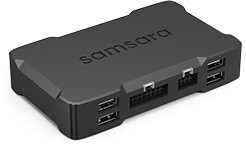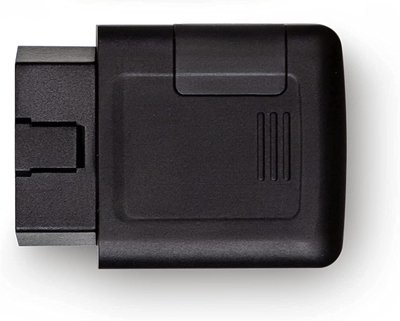Finding the right OBD2 vehicle tracker can save your small business time and money. This guide compares the top plug-and-play GPS trackers, highlighting features, pricing, and pros/cons to help you choose the Best Obd2 Vehicle Tracker for your needs. A bad choice can lead to costly vehicle issues, so making an informed decision is crucial.
Understanding OBD2 Trackers and Their Benefits
OBD2 GPS trackers plug directly into your vehicle’s onboard diagnostics port, making installation simple and eliminating the need for professional wiring. Compatible with most vehicles manufactured after 1996, these trackers offer several advantages:
- Easy Installation: Plug-and-play design requires no special skills or tools.
- Cost-Effective: No installation fees and often lower hardware costs.
- Vehicle Diagnostics: Access valuable data like DTC codes, fuel consumption, and maintenance reminders.
- Discreet Tracking: Compact size allows for hidden placement.
Comparing the Top OBD2 Vehicle Trackers
Choosing the best OBD2 tracker requires careful consideration. Here’s a breakdown of popular options:
Force Fleet Tracking
Designed for small businesses, Force offers a comprehensive solution with no contracts, hidden fees, or expensive add-ons. Features include vehicle health alerts, driver safety monitoring, idling reports, and real-time location tracking. Hardware is included in the monthly price.
| Pros | Cons |
|---|---|
| No contracts | No hard-wired option |
| Hardware included | Returned hardware upon cancellation |
| Comprehensive features at one price | Not for personal use |
| Vehicle health and maintenance monitoring |


Vyncs GPS Tracker
Vyncs offers annual plans with varying tiers, but charges extra for features like faster refresh rates and driver safety enhancements. Basic features include location tracking, geofencing, and maintenance reminders.
| Pros | Cons |
|---|---|
| Roadside assistance add-on | Annual contracts |
| Mileage tracking | Activation fees |
| Maintenance reminders | Hidden costs |
| Slow standard refresh rate |
Connect OBD-II GPS Tracker
Connect offers a basic tracker with standard features but at a premium price. While it boasts a fast refresh rate, the high hardware cost and annual billing may outweigh the benefits.
| Pros | Cons |
|---|---|
| Fast refresh rate | Expensive hardware |
| Maintenance alerts | Annual billing |
| Safety alerts |
OneStep GPS
Suitable for personal and fleet use, OneStep GPS offers basic tracking features and safety alerts. However, the initial cost includes first and last month’s payment plus an activation fee. Limited reporting features may not suit business needs.
| Pros | Cons |
|---|---|
| Safety alerts | Activation fee |
| Geofencing | Limited reporting |
Azuga
Azuga provides driver behavior monitoring, geofencing, and an advanced routing add-on. However, standard features like vehicle diagnostics require a higher-tier subscription, and contracts start at three years. Refresh rates are slower compared to competitors.
| Pros | Cons |
|---|---|
| Intuitive app | 36-month contracts |
| Driver safety features | No trials |
| Dispatch | Expensive for features |
Momentum IoT
Geared towards industries with heavy equipment, Momentum IoT offers basic tracking and geofencing. However, fleet maintenance features come at an extra cost, and driver safety features are lacking.
| Pros | Cons |
|---|---|
| No contracts | Extra cost for maintenance features |
| Asset tracking | No dedicated driver safety features |
| Geofencing | Bulky hardware |
Verizon Connect
Verizon Connect provides comprehensive tracking and analytics with international coverage. However, it comes with long contract periods and a higher price tag compared to similar services. The platform can be complex to learn.
| Pros | Cons |
|---|---|
| International coverage | Long contracts |
| Maintenance alerts | Expensive |
| Route optimization | Steep learning curve |
Samsara
Samsara caters to large-scale fleets with robust tracking, maintenance data, and equipment monitoring. However, long contracts (3-5 years), hardware costs, and complex implementation make it unsuitable for small businesses.
| Pros | Cons |
|---|---|
| Comprehensive platform | Long contracts (3-5 years) |
| Maintenance dashboard | Hardware costs |
| Dash camera add-ons | Complex implementation |
Choosing the Best OBD2 Tracker for Your Small Business
For small businesses, Force Fleet Tracking stands out as the best OBD2 vehicle tracker due to its comprehensive features, affordable pricing, no-contract policy, and included hardware. It strikes the optimal balance between cost, functionality, and ease of use. Other options like Vyncs may be suitable for personal use or if specific features like roadside assistance are prioritized. However, carefully evaluate contract terms and hidden costs.
Frequently Asked Questions about Force Fleet Tracking
How does the free trial work? Force offers a 14-day free trial with free hardware. Return the device if you choose not to continue.
Is my vehicle compatible? Most vehicles from 1996 onwards with an OBD-II port are compatible.
How long does installation take? Installation takes just minutes.
What if I need help? Force provides customer support and a Help Center.
Start your free trial with Force Fleet Tracking today! START FREE TRIAL (This is a placeholder – replace with the actual link)
